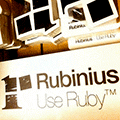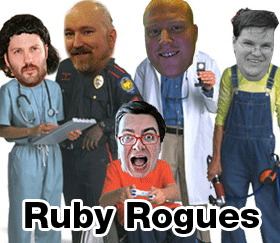
Quick, quick, RubyConf 2011 registration has opened today and until they run out, you can buy tickets at this link. (They cost $350.) (Update July 15 – they seem to have sold out!) Why the urgency? RubyConf is notorious for selling out quickly (I think RubyConf 2009 sold out in 5 hours or something crazy?) and there are still tickets left now, 9 hours later.
RubyConf is taking place between September 29 – October 1, 2011 and it’s in New Orleans, Louisiana, as last year, at the Astor Crowne Plaza Hotel in the French Quarter.
The schedule has also been posted and its highlights include sessions like:
- Exceptional Ruby by Avdi Grimm
- Writing Solid Ruby Code by Jim Weirich
- Advanced EventMachine by Jonathan Weiss
- GitHub Flavored Ruby by Tom Preston-Werner
- Ruby in the browser with NativeClient (NaCl) by Ilya Grigorik
- ..







 Ruby Inside wouldn’t be what it is without you but it’s time for me to thank the companies who also help to keep Ruby Inside going by sponsoring my work. Thanks!
Ruby Inside wouldn’t be what it is without you but it’s time for me to thank the companies who also help to keep Ruby Inside going by sponsoring my work. Thanks!

 Messaging in the context of application architecture (grandly referred to as
Messaging in the context of application architecture (grandly referred to as  I hang out in #nwrug on Freenode, the IRC channel of
I hang out in #nwrug on Freenode, the IRC channel of  A few days ago I told
A few days ago I told 
 The topic of ‘hiring’ always generates a lot of discussion. And why not? Talking about hiring is a convenient way to pass judgment on large groups of people while keeping a professional, detached demeanor.. Ouch! But the topic has enough technical basis to warrant the interest of experienced developers, so here we are.
The topic of ‘hiring’ always generates a lot of discussion. And why not? Talking about hiring is a convenient way to pass judgment on large groups of people while keeping a professional, detached demeanor.. Ouch! But the topic has enough technical basis to warrant the interest of experienced developers, so here we are. You’ve given
You’ve given 
 Just over 3 years ago in May 2008, I
Just over 3 years ago in May 2008, I  Ruby on Rails’ creator David Heinemeier Hansson is currently at
Ruby on Rails’ creator David Heinemeier Hansson is currently at 

 Guess what? Yep, the forthcoming Rails 3.1 is going to be bringing in a few new friends as dependencies:
Guess what? Yep, the forthcoming Rails 3.1 is going to be bringing in a few new friends as dependencies: 
